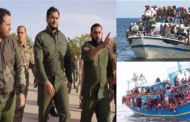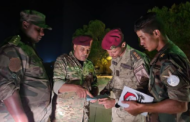11,609 Turkish-backed Syrian mercenaries still present in Libya, only 1,226 repatriated, leaked documents reveal.
Apr. 14, Greece PM Mitsotakis agrees to hold talks with Libya on maritime border demarcation.
Apr. 17, Chad army announces rebel convoy from Libya ‘destroyed’ after attacking country Apr. 11.
TRIPOLI
- Apr. 12, one person was killed and two others were wounded, including a woman, in a car bomb explosion in Janzour, western Tripoli, near the popular island of Saha. The injured were transferred to the emergency hospital. No organization has claimed responsibility for the incident.
AJDABIYA
- The Libyan police seized over 300 kg of cannabis from Tripoli and en route to Ajdabiya, the Anti-Drugs Department said in a statement Apr. 15.
BANI WALID
- Apr. 16, more than 20 migrants managed to escape a detention camp run by traffickers, south of Bani Walid city, 170 km SE of Tripoli.

SEBHA
- Apr. 18, unidentified persons kidnapped 35 Egyptians in the Bani Walid area. They demanded payment of 700,000 Libyan dinars for their release. Via voice messages, the kidnapped Egyptians demanded their relatives to speed up the provision of the sums required for their release. Seven of them were able to pay the required ransom and were released, and 16 others fled while the fate of 12 remains unclear;
- Apr. 13, Egypt dispatched medical aid supplies to Libya on the orders of President Abdel-Fatah El-Sisi. Two military jets were loaded with medical supplies and took off from Cairo, heading for Sebha International Airport, in southern Libya to unload the shipment.
INTERNATIONAL RELATIONS
- Apr. 18, Deputy Head of the Libyan Presidential Council, Musa Al-Koni, received a telephone call from the Russian Deputy Foreign Minister and Presidential Special Envoy for the Middle East and Africa, Mikhail Bogdanov, to discuss enhancing bilateral relations between the two countries;

- Apr. 18, a US State Department official who requested anonymity told Al-Arabiya that the ultimate goal of the United States for Libya is a sovereign, stable, united and safe state, without foreign interference, and capable of combating terrorism;
- Apr. 18, the Director of the Department of Moral Guidance of the Libyan National Army (LNA), Khaled Al-Mahjoub, described the recent United Nations Security Council (UNSC) resolution on Libya as a direct product of the Geneva and Berlin agreements and the 5 + 5 Joint Military Committee (JMC). In a televised interview on the Al-Arabiya al-Hadath channel, Al-Mahjoub added that the committee of experts met in Tripoli, Benghazi, and Sirte. The group comprised of around 60 observers;
- Apr. 17, the Chadian army announced that it had “destroyed” a convoy of rebels coming from Libya that attacked the country on the April 11. This occurred on the day of the presidential elections which President Idriss Déby, who has ruled the country for thirty years, won. In a statement the Chadian Army Staff confirmed that the defence and security forces completely destroyed a convoy of rebels who breached the North of Kanem.
- Apr. 17, the Libyan Prime Minister of the Government of National Unity (GNU), Abdelhamid Al-Dabaiba welcomed the United Nations’ decision calling for the deployment of observers to monitor the ceasefire in Libya. He expressed his government’s readiness to provide the necessary conditions for them to conduct their work;
- Apr. 17, the United Nations High Commissioner for Refugees (UNHCR), Filippo Grandi expressed renewed concerns over the repatriation process of rescued asylum seekers to Libya. He stated that this process could not be considered safe;

- Leaked documents revealed that there are 11,609 Turkish-backed Syrian mercenaries still present in Libya. The documents, obtained by Sky News Arabia, revealed that Turkey withdrew only 1,226 mercenaries out of 12,835 who were sent from Syria. These mercenaries are members of the so-called Syrian National Army (SNA) formed by Turkey;
- Apr. 16, Prime Minister of Libya’s Government of National Unity (GNU) Abdel-Hamid Al-Dabaiba held a meeting with the Russian Defense Minister, Sergei Shoygu in Moscow. The Chief of Staff of the Libyan Army, Lieutenant General Mohamed Al-Haddad attended the meeting;
- Apr. 15, the Syrian Observatory for Human Rights (SOHR) reported that some Turkish-backed fighters in Libya are paying bribes to doctors in order to falsify medical reports enabling them to return to Syria. However, only a few fighters have returned using this method. Meanwhile, the return of mercenaries is still suspended despite agreements, appeals and calls to ensure their repatriation;
- Apr. 15, the Undersecretary of the Libyan Interior Ministry for Illegal Immigration Affairs, Mohamed Al-Shaibani held a meeting with Georgette Gagnon, the Resident Representative and Coordinator of Humanitarian Affairs at the United Nations Support Mission in Libya (UNSMIL). During the meeting, cooperation and support provided by UNSMIL and EU members to the Ministry were discussed, according to a media statement;
- Apr. 15, Russian President Vladimir Putin held a telephone conversation with the Prime Minister of the Libyan Government of National Unity (GNU), Abdel-Hamid Al-Dabaiba, who at that time was on a state visit to Moscow. In a statement, the Kremlin said that President Putin welcomed the formation of the interim GNU, which is scheduled to pave the way for elections at the end of the year. He also reaffirmed Russia’s readiness to continue efforts aimed at strengthening the Libyan political process and ensure the long-term stability, sovereignty, and unity of Libya. As well as establishing progressive social and economic development;
- Apr. 14, Egypt’s Foreign Minister Sameh Shoukry received the UN Secretary-General’s Special Envoy for Libya, Ján Kubiš at the ministry HQ in Cairo. During the meeting, Shoukry affirmed that Egypt will continue its efforts to reach a comprehensive political settlement that preserves Libya’s unity, ensures the exit of all foreign mercenaries, and preserves national institutions;
- Apr. 14, Greek Prime Minister Kyriakos Mitsotakis said he has agreed to hold talks with Libya on marking out their maritime zones in the Mediterranean. Mitsotakis said in a statement after his meeting with the Head of the Libyan Presidential Council, Mohamed Al-Menfi that the two leaders “agreed on the immediate resumption of talks between Greece and Libya on the delimitation of the maritime zones”;

- Apr. 13, the chief advisor to Turkish President, Recep Tayyip Erdogan, Yasin Aktay claimed that Ankara would not back down from its supportive position in Libya. In press statements, Aktay said that there is external pressure on Turkey to withdraw its forces from Libya, confirming that it will not yield to such attempts that aim to influence Turkish policies;
- Apr. 12, Libyan Undersecretary for Technical Affairs at the Foreign Ministry, Mahmoud Al-Tilisi stressed the need to move away from thinking about settling migrants in Libya, regardless of the circumstances.



























